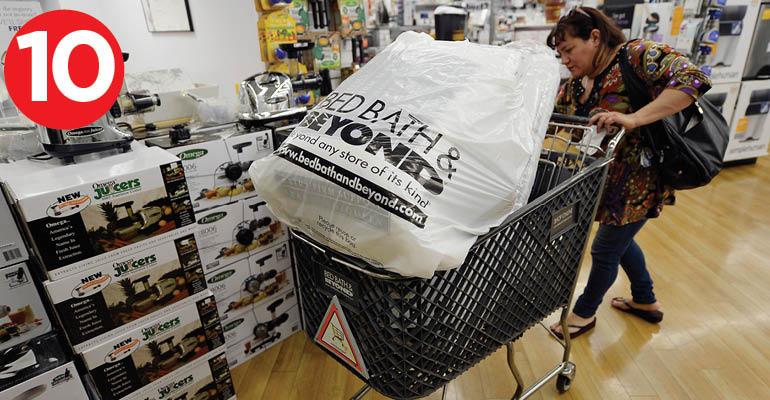- Point, Click, Own: Firms Transform How to Buy Investment Homes “Buying a home as an investment property has long been too complex or daunting a process for all but the wealthy. Thanks to a group of real estate startups, that may be changing. The companies enable individuals to assemble a portfolio of rental homes throughout the country relatively hassle-free. Without ever visiting the properties, investors can buy and manage homes with a few clicks of a mouse or taps on the phone.” (Wall Street Journal, subscription required)
- Why Is Bed Bath & Beyond Selling Half its Real Estate? “It's obvious things are bad at Bed Bath & Beyond, but were they so bad it needed to sell its headquarters and half its real estate? Well, yes, actually. For a business that once regularly touted how well it was able to generate cash, more recently the home goods retailer has been left scrounging in the couch cushions trying to dig up change. But it just came up with a fistful of coins (and an odd assortment of hair clips, some old Cheerios, and a couple of dust bunnies) as it announced it sold 2.1 million square feet of commercial space in a sale leaseback arrangement with private equity that will net it about $250 million.” (Motley Fool)
- Laurel Heights Neighbors Sue to Stop Massive SF Housing Project “A group of Laurel Heights residents have filed a lawsuit against a massive development project that would revamp the UCSF Laurel Heights campus into a 744-unit housing and retail complex. The case, filed last week in San Francisco Superior Court by The Laurel Heights Improvement Association of San Francisco, argues that the city failed to comply with the California Environmental Quality Act in approving the project.” (San Francisco Chronicle)
- Crowdfunding Firms Blow Up the Model to Survive in Real Estate “Dan Miller became a pioneer of real-estate crowdfunding about eight years ago by selling stakes in mainstream property such as hotels, apartment buildings and offices to small-time investors via the internet. Today, he is focused on property with an environmental bent, backing urban farms in Detroit and a grain and dairy farm in Pennsylvania’s Amish country. His new approach reflects a broader midcourse correction for real estate and crowdfunding, the practice of financing a project by raising small amounts of money from a large number of people.” (Wall Street Journal, subscription required)
- Property Insurance Market Hardening Set to Continue “Commercial property policyholders will see ongoing price increases and cuts in capacity through 2020, as insurers maintain discipline, making for a difficult market, industry experts say. Jan. 1 renewals saw rate increases across the board in property, though the level of increase varied by geographic location, catastrophe exposure and loss history by individual account, they say.” (Business Insurance)
- Miami Finally Has a Strategy to Tackle its Housing Affordability Crisis. Here’s the Plan “If Miami’s political leaders are serious about solving the city’s growing affordability crisis, here’s what a sweeping new plan to be unveiled Wednesday says they need to do: Create a bank to finance affordable housing construction and renovations, streamline permitting and tweak zoning, then get small and mid-size developers churning out 3,200 units of housing every year for 10 years — a scale and pace that the plan’s authors call ‘unprecedented.’” (Miami Herald)
- The Cuffs Come Off: The New Decade Brings an Uptick in Cov-Lite Loans “Those who lived through the global financial crisis and survived to tell the tale no doubt have bad memories of the term ‘cov-lite.’ The widespread acceptance of covenant-lite (cov-lite) loans — or borrower-friendly loans that were made with a lack of protective covenants for the benefit of the lender — was a trend that was firmly in play pre-crisis. While we’ve come a long way since the Wild West days of 2006, more than a decade later cov-lite is one hard lesson from the crisis that’s apparently being unlearned.” (Commercial Observer)
- Greystone’s CEO on Multifamily Lending, Affordability “’It’s a great time to be a quality sponsor,’ Stephen Rosenberg, founder & CEO of Greystone, told Multi-Housing News. In the interview below, Rosenberg details the company’s plans for remaining at the head of multifamily lending pack and for helping solve the affordable housing crisis. Rosenberg also reveals how Harmony Housing—the nonprofit he founded to preserve and maintain affordable housing nearing the end of its subsidy period—will explore housing development opportunities.” (Multi-Housing News)
- Middle-Income Households Haven’t Recovered Since the Great Recession—Here’s a Reason Why “I was curious how the middle income households were doing according to the National Retirement Risk Index (NRRI) that the Center for Retirement Research maintains. The NRRI is based on data from the Federal Reserve’s ‘Survey of Consumer Finances’ and is constructed in three steps: 1) projecting a replacement rate — retirement income as a share of preretirement income — for each household; 2) constructing a target replacement rate that would allow each household to maintain its preretirement standard of living in retirement; and 3) comparing the projected and target replacement rates to find the percentage of households at risk.” (MarketWatch)
- Walmart Unveils Tech-Enabled Neighborhood Market Store “Walmart is offering an ultra-streamlined shopping experience at its new Neighborhood Market location in Coral Way, Fla. The discount giant’s latest store in the Miami market features a number of technologies designed to save time for both customers and associates. These include the first online grocery pickup offering in this section of Miami, as well as same-day grocery delivery.” (Chain Store Age)
0 comments
Hide comments





